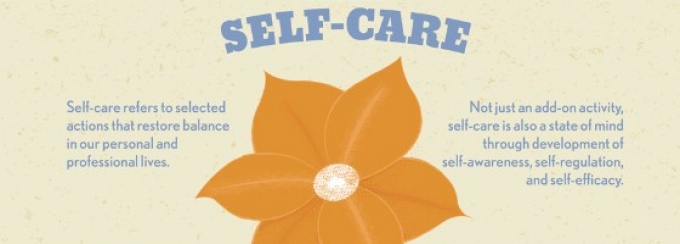Free Self-Care Resources

At the UB School of Social Work, due to our trauma-informed and human rights perspectives, we strongly believe in self-care. Take at look at our self-care starter kit, poster and podcasts.
On this page:
Professional self-care is an essential social work survival skill. We’ve developed a self-care starter kit for our students that will also help social work professionals understand the basics of maintaining and enhancing health and well-being.
A visual inforgraphic-sytle guide to self-care. Handy to have in the office, as a give-away or just as an important reminder at home. Hard copies of the poster are available for request.
inSocialWork Podcasts on Self-Care
inSocialWork® is the bi-weekly podcast series of the University at Buffalo School of Social Work. The purpose of this series is to engage practitioners and researchers in lifelong learning and to promote research to practice and practice to research. inSocialWork® features conversations with prominent social work professionals, interviews with cutting-edge researchers, and information on emerging trends and best practices in the field of social work.
In this episode, Kori Bloomquist discusses research related to social worker self-care practice and perceptions, and professional well-being. Ms. Bloomquist describes social workers' reported self-care practices across five domains as well as their perceptions of self-care. She also discusses relationships between social worker self-care practices and perceptions and indicators of professional well-being, including compassion satisfaction, secondary traumatic stress, and burnout. Furthermore, Ms. Bloomquist talks about implications for social work education, practice, and research.
Burnout and compassion fatigue are significant concerns in professional social work. Either can leave social workers feeling angry, overwhelmed, drained, and/or powerless. This can lead to disengagement from client systems as well as the work. To be effective and professional and develop in their work, social workers must learn the skills necessary to take care of themselves. In this podcast, Elaine Hammond uses a trauma-informed perspective to provide a paradigm for the creation of an individualized self-care strategy.
Dr. Carol Tosone discusses shared traumatic stress, the experience of mental health clinicians dually exposed to a traumatic experience, both primarily as citizens and secondarily through the trauma narratives of their clients. Dr. Tosone discusses results and implications of her research examining the long-term impact of 9/11 and Hurricane Katrina on Manhattan and New Orleans clinicians respectively. Implications include possible shifts in professional boundaries, including increased self-disclosure and therapeutic intimacy, as well as the need for training and self-care for clinicians living and working in a traumatogenic environment.